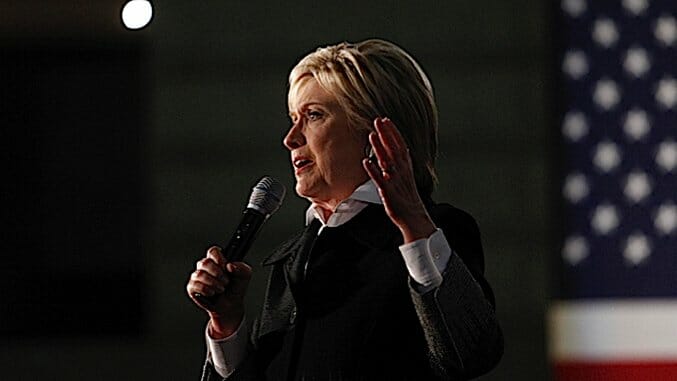Hillary Clinton Could be Our Next LBJ, and That’s Not a Good Thing
Photo courtesy of Getty
In all likelihood, Donald Trump is heading for a smashing defeat, and the only question is, how large will the landslide be? This has led to comparisons between his campaign and Barry Goldwater’s electoral disaster at the hands of Lyndon Johnson in 1964. Evan Osnos, writing in the New Yorker, is only the latest to make the analogy. As Osnos points out: “Nominated over the objections of moderates, Goldwater, who voted against the Civil Rights Act, lost forty-four states to Lyndon Johnson, who took sixty-one per cent of the popular vote, the highest in Presidential-election history.”
Understandably, this comparison is joyfully, Schadenfreude-ly fun for liberals all too ready to dump the Republicans in their graves, and rightfully so. When you think of those men colloquially and erroneously known as “party leadership,” such as Paul Ryan, Scott Walker, Mitch McConnell, et al, the Trump suicide vest really couldn’t have been strapped to a nicer group of zealots, obstructionists, and reactionaries. Yet the more apt and ominous candidate comparison in this election is not between Trump and Goldwater, but rather their two opponents: Hillary Clinton and Lyndon Johnson. The first female president will arrive in office based largely on her (more or less) popular domestic agenda, but with looming decisions of peace and war likely to define her presidency.
Such as it was with LBJ. There is a contentious historical debate over what exactly John F. Kennedy’s intentions were with the French colonialist mess in Indochina. On the one hand, by the time of his assassination in 1963, he’d increased U.S. military advisors and training personnel to roughly 16,000. Yet there has been pushback from those who, like Robert McNamara, claimed Kennedy wanted to withdraw after his reelection (for an exhaustive look at this argument, check out this 2003 Boston Review article by James K. Gailbraith). Whether or not Kennedy would have bowed to the pressure to ratchet up American commitment is one of those historical counterfactuals best explored in Stephen King novels. What we do know is that even as Johnson passed landmark Civil Rights and voting rights legislation while also expanding the social safety net, he took a headfirst dive into the swamp of Vietnam.
The rest is horrific history—not only the 56,000 U.S. dead and 150,000 wounded, but the Vietnamese death toll, with estimates running as high as 3.8 million, according to a 2008 study conducted by the U.N. Johnson (and after him Nixon and, ahem, Nobel Peace Prize winner Henry Kissinger) pounded Vietnam with more munitions than were dropped in all of World War II, defoliated millions of acres with toxic chemicals, rounded up villagers into internment camps, and generally unleashed utter barbarism on the Vietnamese people. In his must-read history of the Vietnam War’s brutality, Kill Anything That Moves: The Real American War in Vietnam, Nick Turse documents the sordid and disgusting nature of the war; how only two decades after the Nuremberg Trials, American national security elites and their civilian leadership sent the U.S. on what amounts to a genocidal rampage through Vietnam, Laos, and Cambodia. The only reason we don’t use that inflammatory word today is due to some heavy-handed historical whitewashing and a will to power for collective amnesia.
What’s that got to do with Clinton? Plenty. While the U.S. national security establishment may not be very good at bringing impoverished countries of farmers and nomads to heel, it has proved adept at not learning any kind of lesson whatsoever from its mistakes, as we saw earlier this decade with the debacles in Afghanistan and Iraq.
Clinton’s hawkishness has been a matter of much scrutiny this election season. During the primary, Bernie Sanders’s challenge helped air all of this: Her support for intervention in Yugoslavia when she was First Lady, her use of the specter of 9/11 as a senator to justify an invasion of Iraq, her vote for that war and full-throated support for that vote up through the 2008 campaign, her support for the troop surge in Iraq and later in Afghanistan as a member of Obama’s cabinet, and her support of intervention in Libya in 2011. There has been some pushback against this narrative, most notably by Richard Sokolsky, who in his op-ed “Why Hillary Clinton Wouldn’t Be a Foreign Policy Hawk,” had to begin his argument by ticking off these many instances in which she very much was a foreign policy hawk.
Many of those voters who came of age during the catastrophe of Iraq flocked to Sanders’s campaign in no small part because Clinton gave us so little reason to believe she’s changed her mind at all about the efficacy of U.S. military power. It’s not that I think Clinton will get into office and immediately begin a Bush-Cheney-like propaganda effort to launch a ground invasion of Iran. What more concerns me is the case of Johnson, perhaps the worst example of a bull-headed frog who hopped into a pot and refused to hop out even as his skin was boiling off. Johnson’s example forever demonstrates how easy it is to dip a toe into a military commitment and how difficult it is to backtrack and extricate America from involvement once that commitment has been given. It’s why we have 5,000 troops in Iraq. It’s why, just days ago, the U.S. suffered its first combat death in the fight for Mosul, as the military attempts to defeat basically the same group of religious gangsters who pooled their Soviet-era AKs in the months after Saddam Hussein fell. It’s why Barack Obama has committed to maintaining 8,400 troops in Afghanistan when he leaves office. Even if a president sees the futility involved in these conflicts, the weight of imperial expectations, and of American “credibility,” creates a momentum of its own that even war-skeptical presidents have great difficulty pushing back against.